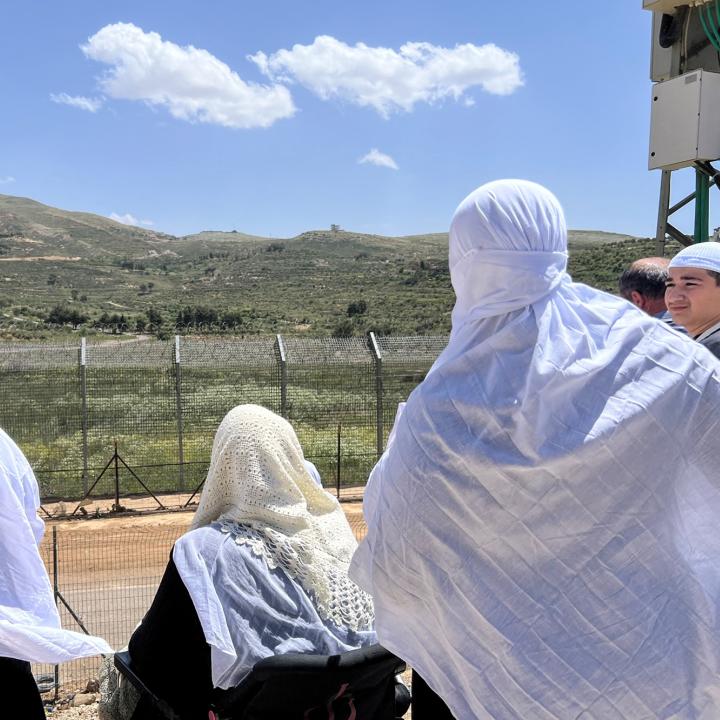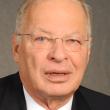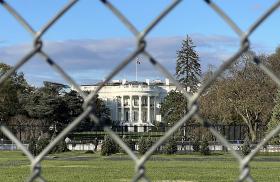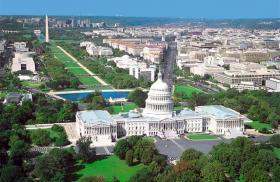
- Policy Analysis
- PolicyWatch 4079
Pursuing Israel-Syria Detente Post-Assad

A panel of American, Israeli, and Syrian experts discuss the prospects of cooperation and normalization between the two longtime belligerents, including the U.S. role in achieving such a deal.
On July 10, The Washington Institute held a virtual Policy Forum with Rime Allaf, Ehud Yaari, Aaron Y. Zelin, and Andrew J. Tabler. Allaf is a Syrian-born advisor, communications strategist, and author of the forthcoming book It Started in Damascus (Hurst, 2025). Yaari is the Institute’s Lafer International Fellow and a Middle East commentator for Israel’s Channel 12 television. Zelin is the Institute’s Gloria and Ken Levy Senior Fellow and author of The Age of Political Jihadism: A Study of Hayat Tahrir al-Sham. Tabler is the Institute’s Martin J. Gross Senior Fellow and former senior advisor to the U.S. special envoy for Syria engagement. The following is a rapporteur’s summary of their remarks.
Rime Allaf
In the history of Syria-Israel negotiations, two important dates stand out: 1991 and 2025. In the early 1990s, the governments engaged in direct negotiations for the first time under U.S. and Soviet patronage, with the intention of building on the 1974 separation of forces agreement. At the time, peace was seen as both the door to normalization with Syria and part of wider regional understandings on non-aggression.
Today, the idea of some form of disengagement between Syria and Israel, if not peace, has received an overwhelmingly positive public response. The Syrian people wish to return to the 1974 agreement, and officials have already made major strides toward normalizing with Israel post-Assad. Even if a formal peace deal or Abraham Accords-like arrangement proves out of reach, a better-functioning 1974 agreement and normalization are possible.
There is some truth to the theory that Syria and Israel stand together against Iran, but observers should be wary about oversimplifying the relationship. President Ahmed Sharaa has repeatedly said that the Syrian state will no longer engage in aggression and that the days of resistance are over, but recent Israeli actions have agitated the local populace. Most Syrians say the government should insist on regaining the Golan Heights as the bare minimum goal during negotiations.
The Islamist dimension of the Sharaa government is not externally focused or globalist. Rather, it harkens back to an Arab, Syrian, and even Damascene-centered identity from the Umayyad era. Many Syrians hang onto this glorious period of Syria’s past and see it as a model for adopting a less aggressive orientation.
As for external actors, Syria now enjoys the embrace of Saudi Arabia, Turkey, and Jordan, along with astonishing mentorship from President Trump. These and other countries have a clear stake in stabilizing the situation. Moreover, Ankara and Washington are pushing the Kurdish-led Syrian Democratic Forces (SDF) to integrate into the new state—a positive development for Sharaa.
Ehud Yaari
Israel and the new Syrian government share quite a few common enemies and interests. When Sharaa’s group Hayat Tahrir al-Sham (HTS) took over the country in December, a vacuum was created in southern Syria, spurring Israel to strengthen its defensive posture there in case an unfriendly actor tried to fill the gap. Although Hezbollah and Iran are substantially weakened, they are still trying to reassert themselves in these areas. In contrast, Turkey has been very careful in dealing with the new Syria, and there is an implied understanding between Ankara and Jerusalem regarding the contours of their respective activities.
Over the past half year, Israel has expanded its relationship with Syria’s Druze population, so Damascus may have to continue accepting this de facto normalization. Communications between Sharaa’s government and Jerusalem are now on a very serious level, but Syria will not join the Abraham Accords, since both governments are unwilling to relinquish the Golan Heights. They are willing to work on upgrading the 1974 agreement, however. The end result may be a non-aggression agreement that does not include full normalization or bring Sharaa fully into the Abraham Accords fold.
Both countries also want to prevent Hezbollah and Iran from reestablishing themselves. Cooperation on this issue is vital and is at least partly in place already. Although the loss of Iran’s land corridor to Hezbollah has left the group relatively isolated in the region, Syria and Israel must continue monitoring the Lebanon-Syria border.
Israel can also provide Syria with natural gas from its East Mediterranean fields. Many players in the region are eager to assist with Syria’s reconstruction and would surely fund a gas provision project. Other common interests include securing the border with Jordan and managing the tributaries of the Yarmouk River Basin. Indeed, much can be done short of a peace agreement or an expanded Abraham Accords, including upgraded trade, tourism, and overflight rights. Many opportunities are within reach, and both countries would benefit from going for them.
Aaron Y. Zelin
Sharaa and his cohort have come a long way from their initial global jihadist mission. Now that they are leading the new government, they have a range of other considerations to contend with, both inside their movement and within Syrian society.
As for rehabilitating relations with Israel, Damascus has taken a relatively muted approach to this issue so far, frequently reiterating its general desire for quiet in the region. The two countries share myriad interests that serve this broader goal, from countering Hezbollah weapons smuggling to fighting the Islamic State and curbing the Captagon trade. Since the fall of the Assad regime, Damascus has acted on intelligence from the U.S. government regarding IS plots, creating goodwill between the two governments. Similarly, the new government has fostered goodwill with Israel by going after some Palestinian terrorist groups inside Syria and returning the archives of executed spy Eli Cohen. Damascus would no doubt like to see Israel return to its “good neighbor policy” from a decade ago, when it helped treat injured Syrian opposition elements during the civil war.
Notably, Sharaa and HTS maintained a pro-Palestinian stance on many Israel-related issues in the years before they ousted Assad. For instance, HTS ideologues celebrated Hamas’s October 7 attack, then later eulogized Hamas leaders slain during the Gaza war, including Ismail Haniyeh and Yahya al-Sinwar. Since taking power, however, officials have shifted their tone and become more pragmatic, realizing that if they start any conflict with Israel, they could end up like Hamas and Hezbollah. Even so, some former HTS members who are not part of the new government expressed satisfaction when Iran’s recent attacks on Israel caused some infrastructure damage. (They dislike Iran, too, but considered the strikes as a welcome comeuppance for Israel’s policies in Gaza.)
Going forward, a non-aggression pact is the most realistic course of action; more confidence-building is necessary before turning to a comprehensive peace agreement or Abraham Accords-like situation. Israel would likely need to withdraw from the areas it has taken inside Quneitra province since the fall of the regime—partly because its activities there are having a deleterious effect on agriculture and water supplies for the local population, and also because of the extra domestic pressure such incursions create for Sharaa.
At the same time, decisionmakers should continue comparing Sharaa’s words with his actions. No one should get caught up in recounting the behavior of HTS before its 2016 split with the global jihadist movement—the situation has changed a lot since then, with Sharaa and his circle establishing a nine-year record independent of those former associations. They now share many interests with Israel, other regional actors, and the United States. If they exhibit any backsliding, it would be immediately noticeable, and foreign actors could quickly change their policies as needed.
Andrew J. Tabler
President Trump’s May 13 call to lift all sanctions on Syria has provided a rare opportunity for Damascus to improve its relationship with Washington in a very fundamental way. U.S. envoy Tom Barrack also recently announced indirect talks between Sharaa and Israel, specifically mentioning the possibility of a non-aggression pact.
Such an agreement would ease tensions that have been aggravated by attacks and incursions across the Golan frontier. In addition, it would enable Sharaa to focus on stabilizing the rest of the country, reorienting it away from Iran, establishing state control over more Syrian territory, and addressing the five points Trump raised on May 13: namely, joining the Abraham Accords, addressing the foreign fighter challenge, ejecting radical Palestinian groups, continuing anti-IS operations, and taking control of detention centers that hold thousands of IS members and their families. So far, Damascus has shown signs of dealing with nearly all of these issues.
The Trump administration’s approach is not centered on nation-building, but rather on determining how well Sharaa can stabilize the country and deliver on his promises. In particular, officials are looking to see how he manages HTS splinter groups, sustains the counter-IS mission, integrates the SDF, addresses government tensions with Druze factions, and organizes the upcoming parliamentary elections.
Washington can influence these efforts in two primary ways: through diplomacy and positive incentives. Diplomacy is well underway, and the most useful “carrot” may be tying U.S. oversight of Israel-Syria peace talks to energy projects. Turkey and Qatar have already announced a $7 billion energy deal for Syria. In contrast, “sticks” are off the table for the foreseeable future, though this situation may change if there is no progress on President Trump’s five points.
As for monitoring and enforcing the terms of an agreement reached along the Israel-Syria frontier, the United States seems unwilling to put boots on the ground there. More likely, another third party (e.g., the UN) will step back in during negotiations, or Washington will ask Jerusalem and Damascus to enforce their own obligations on each side of the frontier. Mutually assured hurt is often better at keeping the peace than separation alone. Whatever the case, both sides have their own reasons to put their disagreements aside and explore the possibility of reaching a bilateral peace deal or expanding the Abraham Accords.
This summary was prepared by Michelle Fan. The Policy Forum series is made possible through the generosity of the Florence and Robert Kaufman Family.






